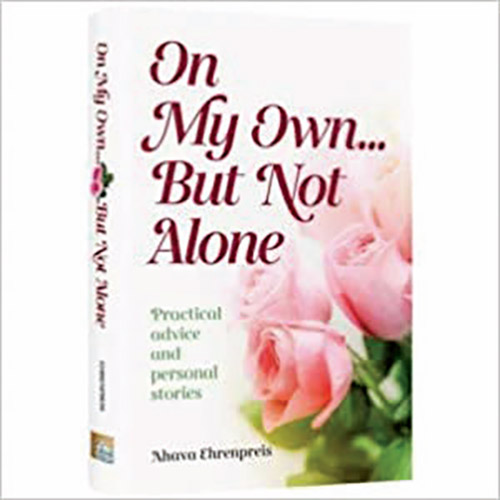
Reviewing: “On My Own…But Not Alone” by Ahava Ehrenpreis. Shaar Press/ArtScroll Mesorah Publication. 2019. English. Hardcover. 320 pages. ISBN-13: 978-1422623312.
Jewish life is centered around the family. The picture perfect nuclear family that is still our shared ideal increasingly appears to be an endangered species. Divorce has become more common, the phrase “singles crisis” is on everyone’s lips, and sooner or later (hopefully later) most people will lose a spouse.
For writer Ahava Ehrenpreis, the loss of her husband Eliezer was a rude awakening. “I had always thought of myself as an independent, knowledgeable person, but I found myself facing many areas for which I was feeling very unprepared.”
New Halachic issues presented in short order. “Every Jewish holiday had its challenges,” she related. “Do I buy my own lulav and etrog for Sukkot? Do I light my own menorah? How do I sell our chametz before Pesach?”
Should she stay home or go to children or friends? “Going away often means giving up the minhagim you’re used to, the family recipes, the special china you’ve always used,” said Ehrenpreis.
The essay “The Empty Chair,” published in Mishpacha Magazine, brought overwhelming responses. Writing about making Pesach on her own, someone she met gushed, “You’re the one who wrote the Pesach piece? Look! I keep it in my purse all the time!”
“I realized how many women in my situation crave both validation and guidance,” said Ehrenpreis. “A friend urged me to write a book, and slowly the idea took hold.”
Ehrenpreis realized that “women going it alone” includes divorcees as well as older singles, and decided to expand the concept to include them. How do you come to terms spiritually when life hands you a deeply challenging situation? How do you negotiate Orthodox life as a single? Many distinguished rabbis and rebbetzins were willing to contribute their perspectives from a haskafic point of view when the plan is not what you expected. Rabbis Yaaov Bender, Henoch Plotnic and Rebbitzins Leah Kohn, Aviva Fiener, and Esther Reisman give practical and spiritual perspectives on many of these questions.
Psychologists (Dr. Norman Blumenthal, Dr. Perella Perlstein, and therapist Esther Moskovitz) speak to issues of loneliness, trauma, coping, dealing with children, and starting to date again. They also address maintaining self-esteem. “When people speak to single women, there’s often a kind of subtle judging, especially with singles and divorcees.”
Lawyer Louise E. Lipman devised a checklist for single women and married couples that can help spouses prepare for unexpected loss. Financial planner Alan Eisenstein offers guidelines for women in different financial situations and looking to the future.
Most importantly, Ehrenpreis showcases personal accounts of women coping with their challenges. Exchanging experiences with others who had emerged intact through a crisis gives encouragement that one can move on to a better place—even find happiness and fulfillment. “Women’s Voices” is a powerful, moving portion of the book, expressing the challenges of women who have faced life-altering events. The women also highlight what others should be aware of; actions or words, however well intended, may be very hurtful, and the women suggest ways that are beneficial.
While readers would be well advised to buy “On My Own…But Not Alone” simply for its valuable legal, Halachic, and financial advice, they will be especially enticed by the moving personal stories of women dealing with widowhood, divorce or singlehood. It can also give others who are not in these situations much greater awareness as to the difficulties and feelings that women on their own deal with on a daily basis. These women would like others to recognize their challenges without pity and, perhaps, with greater sensitivity..
“On My Own…But Not Alone” is a treasure trove of advice, guidance and moving personal accounts. Whether or not individuals have personally experienced these challenges, the book is a valuable tool for gaining understanding and sensitivity, a true education on every level.
“The goal is to validate and guide single women, but I hope it will also open people’s eyes to both the challenges and the heroism of women who have turned their trials into triumph,” concluded Ehrenpreis.
Barbara Bensoussan is a writer whose articles appear in many Jewish publications. She is the author of the newly released “Pride and Preference.”









